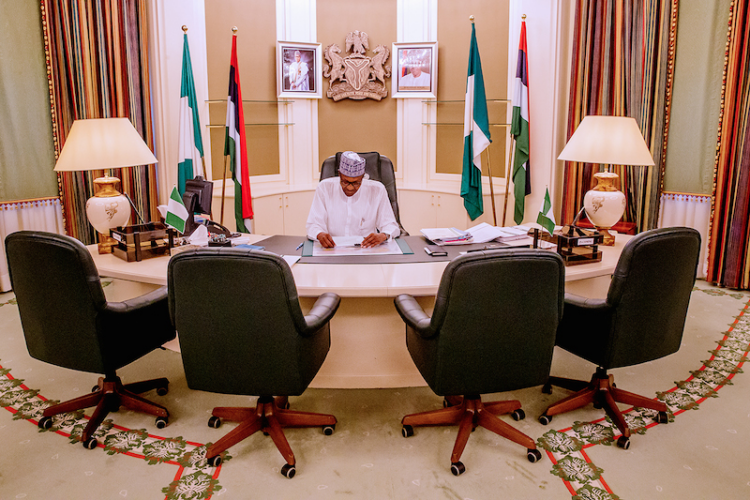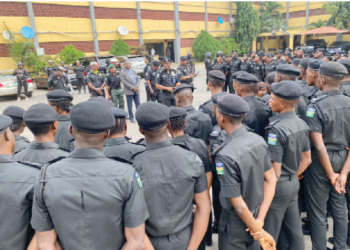Less than 48 hours to the end of the eight years of President Muhammadu Buhari-led administration, one irrefutable fact that must not escape the attention of any objective analyst is that the man who wept openly in 2011 after failing to win the presidential poll is leaving the nation in a deeper hole of depression and desolation than he met her. The outgoing president, who is famed for chasing Maitatsine elements in the 1980s from Kano into Chadian territory before he was ordered by President Shehu Shagari to return, has failed to carry out effective assaults against terror elements waging war against the Nigerian State.
As he bows out from the corridor of power the day after tomorrow, the Nigeria Security Tracker (NST), a mission under the Council on Foreign Relations’ Africa, revealed that under Buhari’s watch, over 63,000 Nigerians were killed. Notwithstanding spending about N8 trillion on defence projects, Nigeria is still among the top 10 dangerous countries in Africa.
For Buhari, who defeated President Goodluck Ebele Jonathan in 2015, with a vow to deal with monsters of insecurity wreaking havoc across the country, the testimonial of Buhari’s government is an attestation of failure when compared with the hopes reposed on his presidency.
Despite assuring Nigerians that safety of lives and property under his watch would be guaranteed, criminal gangs stormed schools and abducted students. Among those schools attacked between 2020 and 2021 are Government Science Secondary School, Kankara, Katsina State; Government Girls Secondary School, Jangebe, Zamfara State, and Government Science College, Kagara, Niger State.
From available records, Buhari is leaving behind 1,400 school children who are still in the den of kidnappers, while spiraling insecurity ripping across the North led to the closure of 11,536 schools, forcing no fewer than 1.3 million schoolchildren to abandon learning during the 2020/2021 academic session.
The outgoing president may have succeeded in decimating the destructive power of Boko Haram, but the audacity of criminal herdsmen operating in the ungovernable forests of Zamfara, Katsina, Kaduna and parts of Kebbi states has led to rising criminal activities in the affected states. In cognisance of the refusal by the government to rein in the activities of these deadly militant groups, the United Nations has declared that the Nigerian Government is “willingly unable” to control these terror groups shredding the country.
The daredevil invasion the Nigerian Defence Academy on 24th August, 2021, and the attack on the Abuja-Kaduna train in Katari on March 28, 2022, including the audacious assault on Kuje Prison on 5th July, 2022, which led to the release of over 150 Boko Haram members, are clear performance indicators for the outgoing president’s rating in the fight against insecurity.
It is unambiguous that Buhari’s promise to end insecurity was turned into a mirage, considering the fact that many Nigerian communities are now soft targets for terror groups. If Boko Haram was the problem of the North-east zone that was then threatening to spread to other Northern states before the emergence of Buhari in 2015, criminal elements have enthroned the culture of fear and turned many areas in the North-west and North-central zones into a barbaric killing field.
Kaduna State, in particular, is now the nation’s headquarters of kidnappings and abductions, with relatives of victims forced to pay huge sums of money as ransoms through their noses to secure the release of their relatives. With industries and other economic ventures going under due to harsh economic realities, crimes have now become profitable enterprises as poverty-stricken survivors are now emergency negotiators between kidnappers and victims’ distraught relatives.
In Kaduna, Benue State, Taraba, Nasarawa, Niger and Plateau, among others, incessant attacks have become weekly occurrences as these monsters in human flesh continue to unleash horrifying deaths on defenceless women, children and the aged.
On the eve of Buhari’s departure from the corridor of power, no less than 120 citizens have been cold bloodedly murdered by these fierce agents of death in Mangu Local Government Area of Plateau State. Peace is yet to return to Kaduna, Niger, Benue and Taraba State as bloody attacks that once made citizens to sleep with their one eye closed are now forced to stand up with sticks to await the marauders whose superior power sends jitters down the spines of security operatives.
On the economic front, the records set by Buhari have been dismally uninspiring. At the end of his first tenure in 2019, the maximum lending rate rose to 31.6 per cent, leading to the death of hundreds of thousands of small businesses. With the current maximum price of commercial funds at 28.6 per cent as approved by the Central Bank of Nigeria (CBN), small business ventures which generate nearly 90 per cent of Nigerian jobs, according to the International Labour Organisation (ILO), are now forced to pay 33 per cent and above as interest rate.
Galloping inflation remains the major headache of Nigeria under Buhari as the 2019 border closure left millions of households struggling for survival. Amidst the worsening insecurity tearing the nation apart, farmers were unable to access their farmlands, thus prompting the World Food Programme (WFP) and the Food and Agriculture Organisation (FAO) to warn in 2020 on looming food shortages, especially in the northern part where militants had turned the zone into a battlefield.
Under Buhari, the dual exchange rate between the naira and dollar turned out to be mortuary for the local currency as the exchange rate plunged to the lowest where N740 was exchanged to the dollar in the black market.
Ahead of the release of labour statistics by the National Bureau of Statistics (NBS), the Nigerian Economic Summit Group (NESG) and KPMG hooked the unemployment rate at 41 and 37 per cent respectively. The NBS had in its last labour data released at the end of 2020, said the country’s unemployment rate tripled to 33.3 percent than what it was in 2015. Under Buhari, Nigeria overtook India to become the ‘World’s Headquarters of Poverty’. Cascading destitution, made worse by the increasing number of citizens living from hand to mouth, has become fear-provoking for many millions of citizens. In 2022, the NBS estimated that 63 per cent of persons living in Nigeria, constituting about 133 million people, are multi-dimensionally poor. More scary is the fact that out of these 133 million people, 86 million of them are from Buhari’s North.
The last five days have been a flurry of activities for the outgoing President. In what some critics describe as desperation to meet up with certain nebulous obligations, Buhari wrote to the National Assembly requesting for an approval to obtain $800 million loan to share to the poor and low income. For a nation whose debt profile is creating ripples in the Debtors’ Club, the request has become a huge joke even to members of the 9th National Assembly seen as a rubber stamp of President Buhari.
Buhari has also requested approval to pay judgement debts awarded by various courts in various currencies as follows:$556.7 million, N226 billion and 98.5 million pounds. Some Nigerians are still asking why a president that was in power for eight years would resort to seeking last-minute approval to pay such judgement debt. Why not allow the incoming administration to handle such judgement debts?
The eight years of Buhari can best be summed up as a thriller of terrifying years for many Nigerians and decreasing capacity of democracy to resolve our problems. It was under Buhari that ethnicity and religion became an armour deployed by self-seeking Nigerians to sorely divide our people. Innocent blood of defenceless citizens have flowed and still flowing on Nigeria’s soil as a power cabal committed to its interests rules supreme. In all these, President Buhari has embraced the power of silence to feign ignorance.
As President Buhari leaves power in the next 48 hours, he must be told that the buck stopped on his table. His government will go down in history as one of the worst in giving all federating units a sense of belonging. May God do to him what he did for his nation and millions of people who supported him to become President.
Fare thee President Buhari. May you never be missed! Nigerians, buckle up for the challenges ahead. Asiwaju Bola Ahmed Tinubu may not be the answer to our nation’s problems, but he represents a new dawn in working together to get back our nation from terrorists shredding our nation.















